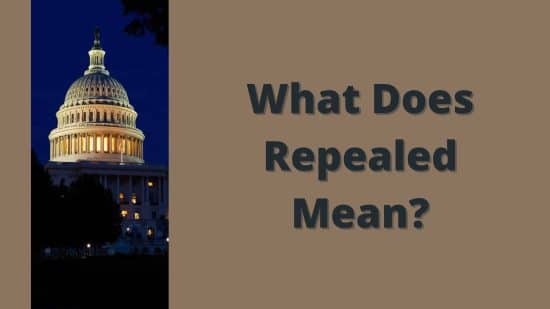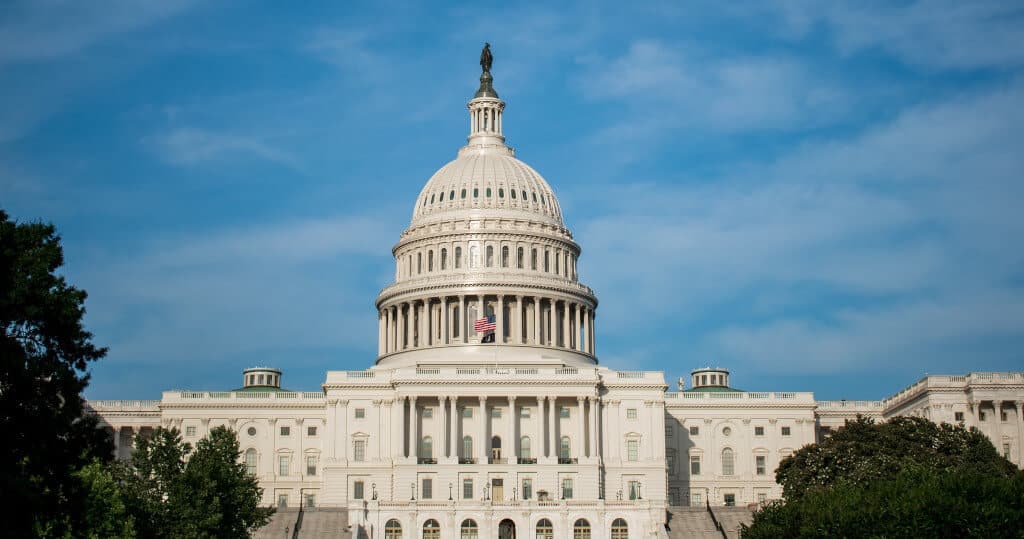

Most Americans think that “repealed” means something was removed or taken away.
But in reality, “repealed” is just another word for “canceled.”
What does repeal mean?
Repealed is a term used when one legislative body officially cancels or annuls a previous law. The official term is “repeal.”
Table of Contents
Under the United States Constitution, Congress can repeal laws by passing a bill that the president signs.
The president can propose repealing legislation to Congress, and Courts can declare a law unconstitutional (and this will normally make the law in question null and void) but cannot repeal it.
Repealing laws can be done by:
If a law is repealed, it means that the law no longer exists. For example, if Congress passes a new bill and the president signs it into law, they have repealed any previous legislation on the same subject.

In general usage, “repeal” simply means to annul or rescind. However, in government documents and other official sources – such as those related to constitutional law – the term “repeal” is used when one legislative body officially cancels or annuls a previous law.
The president can propose repealing legislation to Congress and

The court can declare a law unconstitutional (and this will normally make the law in question null and void) but cannot repeal it. This is because of the separation of powers between the three branches of government: the judiciary, executive, and legislature.
The courts have no power to make or change laws, as that power lies with Congress alone. However, they can determine whether a law or action is valid or not under existing laws.
For example, if an individual was charged with murder and prosecutors argued that killing another person was not illegal (because Congress had never passed legislation making murder illegal), then this would be rejected by courts because there are many things that society has deemed unacceptable behavior for centuries.
Therefore, these actions should still be considered illegal even though there hasn’t been any specific legislation created against them by Congress.
Join the thousands of fellow patriots who rely on our 5-minute newsletter to stay informed on the key events and trends that shaped our nation's past and continue to shape its present.
A law repealed in the USA means that it has been abrogated or eliminated.
Repealing a law is possible in two ways: either it is a literal declaration by a later law, or it is implied by a new statute that contains provisions that contradict or override the former one.
Repealing a law can be either positive or negative, depending on the specific circumstances.

The most famous case of a law repealed in the USA is the Woodruff v. Trapnall case. This case involved a judgment debtor of the State of Arkansas, who was entitled to receive his notes as payment for his debts.
However, the state had repealed a section of the bank charter, and the plaintiff could no longer enforce the judgment.
In the United States, the process of repealing a law is usually initiated by legislation sponsored by members of Congress who disagree with the existing law.
If this repeal legislation passes the House of Representatives and the Senate, it is then sent to the president for approval. If the president signs the legislation, then the law is repealed.
However, if the president vetoes the legislation, then it must be approved by a two-thirds majority in both the House and Senate to be overridden and become law. Once a law is repealed, it is no longer in effect and cannot be enforced by either state or federal agencies.
When the president repeals a law, the law is no longer in effect. The process of repealing a law is different from amending or revoking a law. When a law is amended, it is changed in part. When a law is revoked, it is completely nullified.
The consequences of repealing a law can be far-reaching and depend on the specifics of the law that was repealed. In some cases, repealing a law may mean that the government no longer enforces that regulation.
In other cases, repealing a law may have more significant consequences, such as undoing the progress made in addressing a societal issue.

For example, if a president repealed a law that increased funding for education, it could have detrimental effects on the quality of education in America.
If a president repealed a gun control law, it could lead to an increase in gun violence. Repealing certain environmental laws could lead to more pollution and climate change.
The consequences of repealing a law are often highly contested and can be very controversial.
The word “repeal” means to revoke or rescind a law. When used about a bill, it usually refers to when Congress decides to cancel out a previous law that it had previously passed. There is a long history of Congress repealing laws in the United States, some with unintended consequences.
There can be many reasons why Congress might want to repeal a law. Perhaps the most common reason is that the original law is no longer seen as necessary or is seen as counterproductive.
For example, after the September 11th attacks, Congress passed a series of laws to improve national security. Some of these laws, such as the Patriot Act, were later repealed because they were seen as violating civil liberties.

Repealing a law can also be seen as a way for Congress to signal its disapproval of an existing policy without having to overturn it directly.
This was the case with the Affordable Care Act (ACA), passed by Congress in 2010 but repealing its key provisions became a top priority for Republicans after they gained control of both chambers in 2016.
While they were ultimately unsuccessful in repealing the ACA outright, they did succeed in signaling their disapproval of the law and making it harder for it to function effectively.
There can be many pros to repealing a law.
There are many potential cons to repealing a law. Some of the possible negative consequences include:

In the United States, the process of repealing a law starts with the Congressional Review Act. The first step is for Congress to pass a joint resolution of disapproval. The president must sign this resolution before it can become law and repeal the original legislation.
If a joint resolution of disapproval is enacted, it invalidates the regulation being repealed. This means that the regulation can no longer have any force or effect and cannot be re-issued in the future.
All agencies are required to take steps to remove any references to the repealed regulation from their websites, manuals, and other guidance documents.
It is important to note that once a law is repealed, it cannot be re-enacted without going through the entire process again. This includes passing another joint resolution of disapproval and having it signed by the president.
Repealing a law means canceling it permanently so it cannot be put back into effect. There are two ways to repeal a law in the United States: through Congress or the court system.
If Congress repeals a law, it needs to pass a new law that specifically states that the old law is no longer valid. The old law is then removed from the books. For example, in 2017, Congress repealed the Affordable Care Act (ACA), also known as Obamacare.

The court system can also repeal a law, but this happens less often. If the Supreme Court decides that a law is unconstitutional, it can strike it down. This means that the law is no longer in effect and cannot be put back into place.
The implications of repealing a law vary depending on the nature of the law and its impact on the country.
For example, if a law is repealed that provides for environmental protections, the repeal could have disastrous consequences for the environment. Alternatively, if a law is repealed that was never enforced or that was found to be unconstitutional, the implications may be less significant.
In the United States, the repeal of the law is the process by which a law is declared no longer in effect. Repealing a law can be done by Congress, the president, or a state legislature.
When Congress repeals a law, it is no longer in effect and cannot be enforced. Congress can repeal a law that it has previously passed, or it can repeal a law that the president has enacted. If Congress repeals a law that the president has enacted, the president can veto the repeal.
A state legislature can repeal a state law at any time. If a state legislature repeals a federal law, the repeal does not affect the federal law. However, it may affect how it is interpreted and applied in that state.
Repealed is a term used when one legislative body officially cancels or annuls a previous law. The official term is “repeal.” Under the United States Constitution, repealing laws can be done by Congress (through the passage of a bill and then signed by the president). The president can propose repealing legislation to Congress, and Courts can declare a law unconstitutional (and this will normally make the law in question null and void), but cannot repeal it.